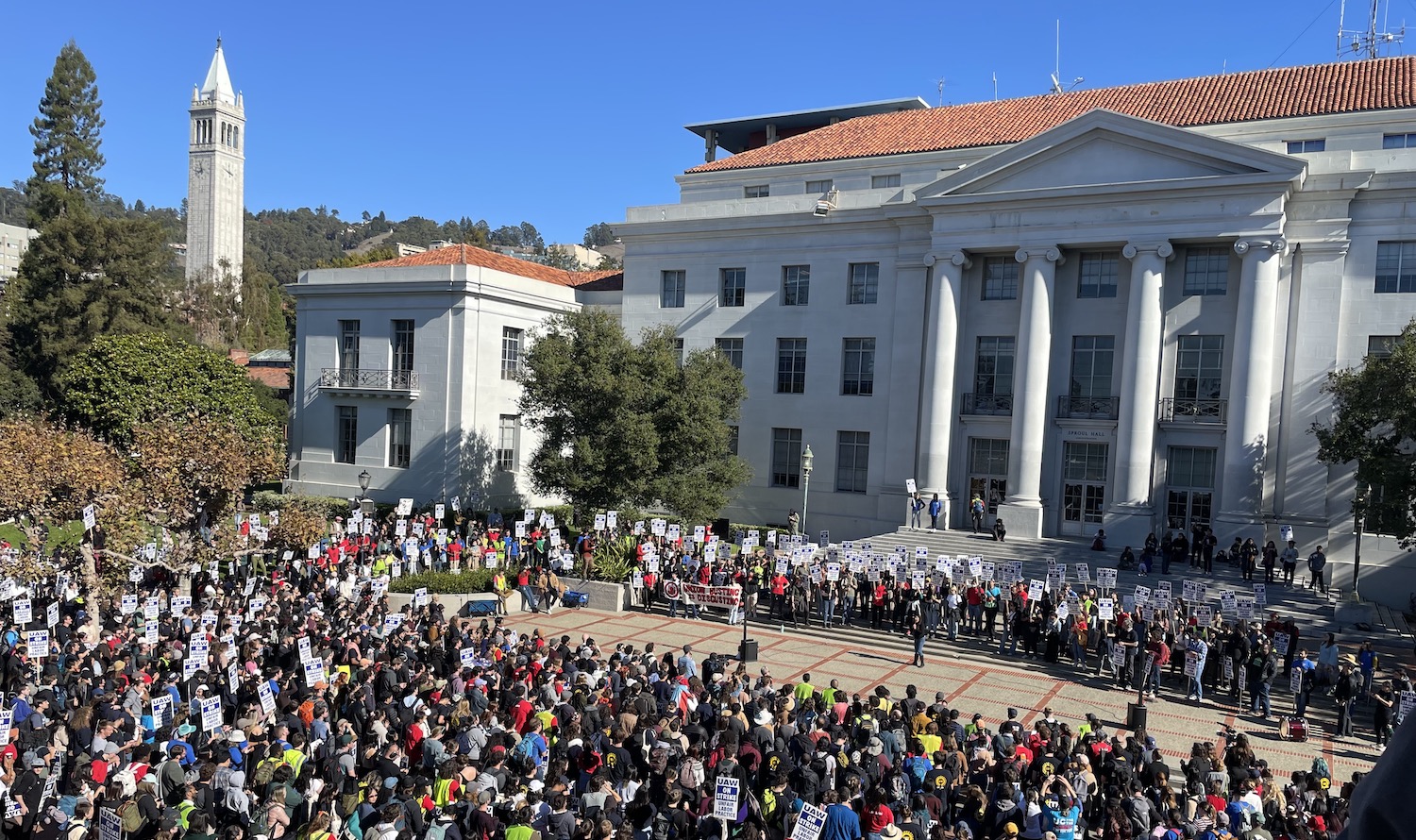BERKELEY — The Sather Tower carillon tolled noon, bong-bong-bong-bong, as a representative from the University Professional and Technical Employees told the gathered thousands a story about the last time his union had to go on strike. The University of California wanted to cut into bone, he said, proposing to permanently shrink their pension for the pitiful reward of a 10 percent raise over five years. UPTE went on strike in March 2019, bong-bong-bong-bong, and won big concessions in a contract they signed with UC in July 2019. They were only forced to strike because the university stiffed them in 17 bargaining sessions spread out over two years. "This could be a long fight," he warned the crowd. "We can't expect the people in charge to do the right thing; we have to make them." Bong-bong-bong-bong.
On Monday, 48,000 academic workers from the University of California walked off the job. The bloc is comprised of a dazzling array of workers: Graduate students, postdocs, academic researchers, graders, student researchers, spread across four different bargaining units, representing all 10 UC campuses. Some striking students are in their early 20s, while others are approaching retirement age. Some make hefty salaries, while many make less than $25,000 per year. They represent if not the heart of the UC system, then its vasculature; they are the people that actualize the university's mission and keep it alive by teaching classes, securing grant funding, and writing academic papers.
The long-brewing UC strike also represents the intersection of two major labor trends. Over the past few years, as the economic contradictions of marketized higher education have more acutely pinched down on graduate students as the chokepoint that makes the exploitative model function, students and academic workers across the country, at schools like Columbia, Michigan, and Illinois, have been standing up for themselves and demanding fair treatment. At the same time, organized labor is making historic inroads at famously exploitative companies like Starbucks, Amazon, and Apple, and national support for labor unions is at a 57-year high. All the more inspiring is the fact that those gains are being made in the absence of a coherent national movement, and had started to pick up steam before the pandemic strained working conditions further. The UC strike is both the largest academic worker strike in United States history as well as the largest labor action in the country since 2019.
The contentions from the four units that cohered into the striking 48,000 are multifaceted, though they share the crucial through-line that these workers are underpaid for the immense labor they perform for the university. It's a very simple dynamic: the University touts the papers they publish, the education they provide, and the research they perform, the majority of which is done by graduate students and researchers. Stacey Frederick, a researcher in UC Berkeley's College of Natural Resources who is on one of the bargaining teams, told me that many research positions are "100 percent grant-funded." Several graduate students I spoke to on the first day of the strike described a class teaching structure that would not function without them. "Do you think they could teach or publish papers without you?" asked the final speaker at Monday's strike-opening rally. The answer is obvious, and revealing. Without its armada of researchers and grad students, the UC system is essentially a baroque real estate scam.
If you have spent any serious time at a university, you have experienced this dynamic. The professor lectures and assigns reading, and the graduate student instructor grades all the assignments, administers the tests, and does a serious amount of the actual breaking down of material into digestible chunks. Most of them are only nominally compensated for that labor. The modal salary for graduate student workers is $23,247. Megan Riley, a PhD student in UCLA's Department of Information Studies, told me that she still struggles to afford rent on a spot that's a 40-minute drive from campus, despite working as a Special Reader, Teaching Assistant, and library worker for the school. "I was actually supposed to be a Teaching Assistant this quarter, and I'd signed a contract for that just days before the fall quarter started. But the next day i was informed that the class was being canceled because the department couldn’t find anyone to teach it," she said. The school asked her to teach the class herself, with the nominal help of an instructor of record, and she said no, because doing so would have been exploitative on TA wages. She is going to have to leave L.A. to finish up her degree remotely, because she can't afford to live in the city.
The whole thing about the University of California system is that it's in California. The rental market is prohibitively expensive across the state more or less without exception, and in many of the cities where UC campuses are located it is historically bad. Paying a grad student less than $24,000 for the work they do is definitionally exploitative, but to do so in places like Santa Cruz, Los Angeles, Berkeley, and Santa Barbara is ridiculous. "Most of the membership is rent-burdened," Frederick said, which is a statistical denomination for anyone who has to spend more than 30 percent of their income on rent. Stories abound of grad students living in garages, donating plasma to make ends meet, and living on the street because they cannot afford to live in the cities they work in. Those are the extreme cases, but even on the more mundane end of the spectrum, the UC's low wages make it difficult to justify working there. Frederick told me of several friends who left positions they loved because they couldn't afford to stick around. I heard of a few students who had to leave PhD and Masters programs because it no longer made sense to endure the exploitative dynamic. "Even in the places where it's cheaper to live, people are asked to compromise," Frederick said.
It is worth spelling out here that the prohibitively high cost of housing is not incidental to UC campuses being located in hot rental markets. It is instead a direct result of it, one often fueled by the universities themselves. UC Berkeley, for example, owns a stunning amount of property and land, houses only 22 percent of its students in university housing, which is extremely expensive in its own right; the institution openly brags about essentially functioning in its own city as a private developer. The state of California only furnishes 13 percent of the UC system's budget, which has incentivized the member schools to aggressively pursue a variety of investment strategies, including making big-time real estate investments adjacent to their campuses and throughout their cities. UCLA just bought a whole college campus. The logic here is that if renting property to students and other employees who have to live in these expensive cities so that they can work for these prestigious universities guarantees a steady and high level of demand and corresponding high rents, why not get in on that easy money-making opportunity, especially when you control so many of the other levers? Why not just behave like a hedge fund that happens to teach a few classes?
As of Tuesday morning, the two sides are quite far apart. The union is demanding a minimum salary of $54,000, while the university wants pay decreases. The union is also asking for better transit benefits, job security measures, and, the big one, robust child care stipends; the university wants cuts or no changes to everything, and has already illegally started fucking with union members' transit benefits. That's part of a suite of what the union characterizes as bad-faith bargaining tactics. Frederick told me that she was surprised how little give UC negotiators had shown even for smaller measures that the two sides should theoretically be able to agree on, like anti-bullying protections. Several bargaining members described UC negotiators calling a bargaining session only to skip out on it, or show up hours late.
But the union has been negotiating with the school for a long time. They know what they're in for. Conditions were so bad that grad students at UC Santa Cruz, which has maybe the most punishing housing market in the country, broke with the union and started a wildcat strike demanding COLA increases back in 2019. The university fired most of them, and though it later reinstated many of them, it was a sign that a much more serious pitched battle was looming. The postdocs have been in talks with the school for more than a year, and this strike is the result of years of little to no progress. "Admin is terrified," a speaker at the rally gleefully announced. "They look dehydrated, they did not look well. You can hear it in their voices, you can see it in their eyes."
Considering the gulf between the two sides and the UC's wonky budget, a natural question is where the money that workers are demanding would come from. The answer shouldn't surprise you. This past January, the UC Board of Regents voted 16-1, with one abstention, to raise the salaries of their nine chancellors, with the chancellor of UC Santa Barbara earning a 28 percent raise up to $579,750. The argument was that their chancellors were paid below market rate and they needed raises to ensure the UC could remain competitive in hiring visionary leadership, and it's quite brazen to argue in favor of beefing up the bureaucracy while simultaneously proposing salary cuts to 48,000 workers who do all the real work and are making a more persuasive version of the same exact argument to you and the public. After California roared into 2022 with a massive budget surplus, Governor Gavin Newsom boosted the UC budget by five percent and forked over a one-time $185 million lump sum. That the administration is proposing austerity for the masses while raising their own salaries, even after that, should tell you all you need to know about why the union is fighting.
And what a fight it will be. Finals are coming up fast, and the universities are unequipped to administer them without the help of the strikers. The mood on campus on the first day of the strike was jubilant, as it should be on the first day of such a historic action, and while history suggests that the decision to strike tends to accelerate the negotiating process, history is also without a precedent for a striking force of academic workers this diverse and this large. That, to me, suggests a strength, not a weakness. It speaks to a commonality of experience across age, salary, and power within the four-unit union. Workers in well-funded departments, who make far more than $23,247, are striking alongside their much more exploited colleagues. Career researchers at nationally prestigious institutions like the Lawrence Berkeley National Lab are on the picket line next to the Ethnic Studies students fresh out of undergrad. Drivers organized with the Teamsters are refusing to deliver packages to the UC during the strike. Some professors, who I think have far more in common with their graduate students and researchers than the administrators, have expressed solidarity with the strikers. The specter of lost wages obviously haunts proceedings, but I don't think the UC wants the sustained period of bad press this strike will earn them, nor the loss of a semester or more because they won't pay the people who make the school function.
The administration's argument, at least implicitly, to their exploited students and researchers is that they are trading short-term wages for the long-term prestige of association with the vaunted UC system. This elides the toweringly inconvenient fact that the people who actually maintain that prestige are currently on strike. I saw several signs on Monday noting that one cannot eat prestige. One speaker put it bluntly: "Nobody cares how many Nobel laureates you have if you don't have your 48,000 workers."





